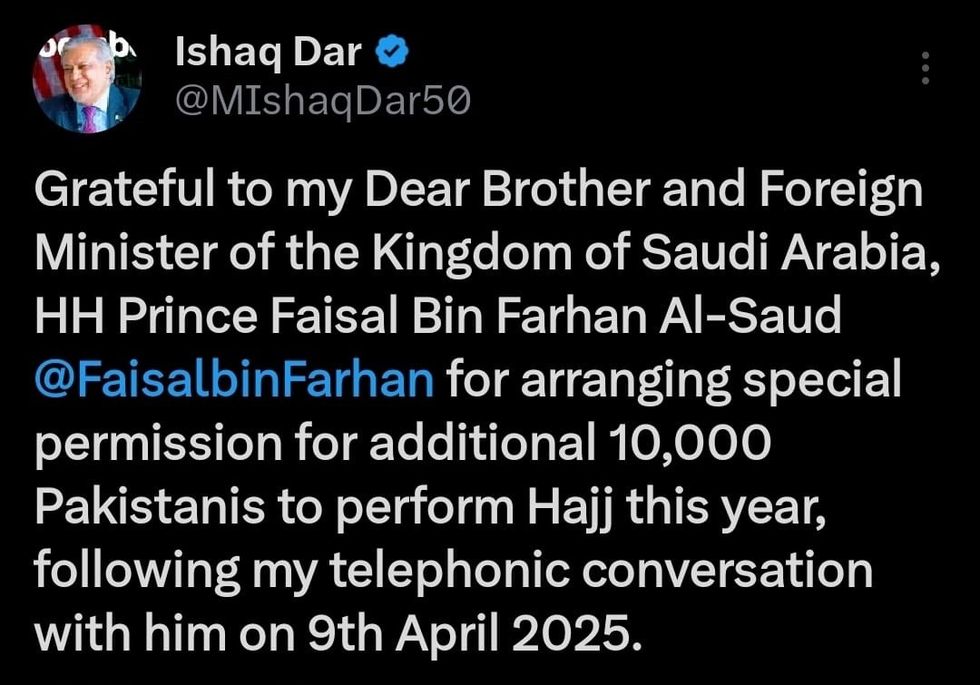Saudi Arabia opens doors for 10,000 Pakistani pilgrims after 77,000 were barred
Pakistani government calls Saudi decision a reflection of the strong ties and cooperation between the two countries

Javed Hussain
Correspondent
I have almost 20 years of experience in print, radio, and TV media. I started my career with "Daily Jang" after which I got the opportunity to work in FM 103, Radio Pakistan, News One, Ab Tak News, Dawn News TV, Dunya News, 92 News and regional channels Rohi TV, Apna Channel and Sach TV where I worked and gained experience in different areas of all three mediums. My journey from reporting to news anchor in these organisations was excellent. Now, I am working as a correspondent with Nukta in Islamabad, where I get the opportunity of in-depth journalism and storytelling while I am now covering parliamentary affairs, politics, and technology.

Muslim pilgrims circle the Kaaba and pray at the Grand mosque in the holy city of Makkah, Saudi Arabia.
Reuters
Pakistan thanks Saudi Arabia for allowing 10,000 more Hajj pilgrims.
The decision follows a call between Pakistan’s deputy PM and Saudi foreign minister.
The fate of 67,000 aspiring pilgrims remains uncertain.
Saudi Arabia granted permission on Friday to 10,000 Pakistanis -- previously among 77,000 barred -- to perform Hajj after they were initially disqualified due to their private tour operators’ failure to meet the kingdom’s payment and service contract deadlines.
The development was confirmed to Nukta by an official of the Ministry of Religious Affairs, who said the decision followed a phone call between Deputy Prime Minister Ishaq Dar and Saudi Foreign Minister Prince Faisal bin Farhan. Pakistan had formally requested the extra quota to ensure more pilgrims could undertake the sacred journey.
For Hajj 2025, Saudi Arabia allocated a quota of 179,210 pilgrims to Pakistan based on its population, which the Pakistani government split evenly between the official government scheme and private tour operators.
However, for the first time in Pakistan’s history, more than 77,000 pilgrims registered under the private Hajj scheme were unable to travel after their tour operators failed to fulfill key obligations related to payments and service agreements with Saudi authorities.
The unprecedented situation had triggered widespread outrage in Pakistan and led Prime Minister Shehbaz Sharif to establish a high-level inquiry committee to investigate the lapse and hold those responsible to account.
The Saudi Ministry of Hajj and Umrah had set February 14, 2025, as the final deadline for countries in Zones One and Two — including Pakistan, India, Bangladesh, Nigeria, and several African nations — to finalize accommodation, food, transport, and Tawaf-related service contracts. Pakistani private operators missed that deadline. An additional three-day grace period to February 17 was also missed.
As a result, Saudi authorities had revoked all Hajj quotas for Zones One and Two, preventing over 77,000 Pakistanis from traveling under the private Hajj scheme. Only around 12,500 pilgrims—whose data and payments were submitted on time—were cleared to proceed.
In the latest development, the Saudi government has agreed to accommodate 10,000 Pakistani pilgrims from a group of 77,000 who were previously barred from performing Hajj.
The Pakistani government described the Saudi decision as "a sign of deep-rooted ties and cooperation between the two brotherly Islamic countries", and highlighted Saudi Arabia’s special regard for the people of Pakistan.
Meanwhile, Deputy PM Ishaq Dar on Friday evening thanked the Saudi foreign minister on X for allowing 10,000 more Pakistanis to perform Hajj after their April 9 call.

The beginning of the crisis
According to documents obtained by Nukta, Pakistan’s Ministry of Religious Affairs and private Hajj operators signed an agreement in December 2024 with Saudi Arabia, requiring all bookings to be completed by February 14, 2025.
Despite this, most private operators failed to meet the deadline, reportedly due to policy disagreements with the ministry and delays in collecting advance payments from pilgrims.
Federal Minister for Religious Affairs Sardar Muhammad Yousaf traveled to Saudi Arabia to seek an extension but was unsuccessful.
Prime Minister Shehbaz Sharif later took notice and formed a three-member inquiry committee to investigate the failure. The committee's deadline was extended to next week to gather further input from the Ministry and the Hajj Organizers Association of Pakistan (HOAP).
What Hajj organizers had to say
In their briefing to the inquiry committee, Hajj organizers cited eight key reasons for the crisis.
They pointed to an unusually early contract deadline -- moved up by two months compared to the previous year -- and a lack of coordination in the release of public and private Hajj policies.
They also highlighted delays caused by Saudi Arabia’s re-registration of only 500 organizing companies, which slowed the approval process. Currency restrictions from the State Bank of Pakistan further complicated matters, including limited permission for money transfers to Zones One and Two and a partial foreign exchange ban.
Organizers noted that overseas Pakistanis were barred from registering under the private scheme, and the central bank’s requirement to repatriate 38% of foreign currency caused additional delays.
Furthermore, despite transferring funds for 13,000 pilgrims, land was not allocated in time by Saudi authorities. Finally, several days of outages on the NASUK digital platform disrupted booking operations.







Comments
See what people are discussing